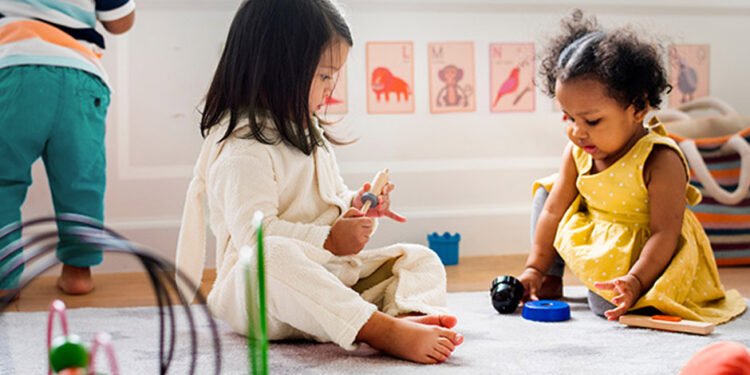Starting childcare can be a significant milestone for both children and parents. It’s natural for kids to take time to adjust to a new environment, unfamiliar faces, and a change in routine. However, for some children, the transition to childcare can be more challenging. If your child is struggling to adapt, it’s essential to remain patient, understanding, and proactive in helping them settle in. The good news is, with the right approach, most children eventually feel comfortable and thrive in their new setting.
In this article, we’ll explore practical strategies to help your child adjust to childcare, ensuring the experience is as smooth as possible for both of you.
1. Understanding Why Some Children Struggle with Childcare
Every child is unique, and the reasons for difficulty adjusting to childcare can vary. For some children, the new environment of a childcare centre, like child care in Liverpool, may be overwhelming because of unfamiliar faces and surroundings. Other children may feel anxious about separation from their parents, especially if they’ve spent most of their time at home. Temperament plays a role as well—some children are naturally more adaptable, while others may need extra time to feel comfortable in new situations.
It’s essential to understand that these feelings are normal and not a reflection of any shortcomings. Transitioning to childcare is a significant change, and every child adjusts at their own pace. By understanding the root of their discomfort, you can provide more targeted support.
2. Prepare Your Child Before the First Day
One of the best ways to help your child adjust to childcare is by preparing them before their first day. Start by talking positively about childcare, explaining what to expect, who they’ll meet, and what activities they might do. Use simple language and focus on the fun aspects, like making new friends, playing games, or learning new things.
Consider visiting the childcare centre together before their official start. Introduce your child to their carers and the environment, allowing them to familiarise themselves with the surroundings. This can reduce some of the anxiety related to the unknown. Many centres offer orientation sessions where children can attend for a few hours before their first full day—this gradual introduction can make a significant difference in easing the transition.
3. Create a Goodbye Ritual
One of the most challenging aspects of starting childcare is the moment of separation. Children may cry, cling, or become upset when it’s time for parents to leave. Creating a consistent goodbye ritual can help make this moment less stressful for both you and your child. A goodbye ritual could be something simple, like giving them a special hug, a high-five, or a loving phrase that you say each morning.
It’s important to keep goodbyes short and positive. Lingering can reinforce your child’s feelings of anxiety, while a quick and upbeat departure helps them understand that you trust they’ll be okay. Reassure them that you’ll return at the end of the day, and stick to your promise—children feel more secure when they know they can count on you to come back at a predictable time.
4. Be Patient and Supportive
Adjusting to childcare can take time, and some children may need several weeks or even months to feel completely comfortable. During this period, patience is crucial. Resist the urge to compare your child’s progress to others, as every child develops at their own pace. Instead, focus on the small improvements your child makes, whether it’s playing independently for a few minutes or participating in a group activity.
Listen to your child’s concerns and validate their feelings. If they express fear or anxiety, acknowledge their emotions without minimising them. Let them know that it’s okay to feel nervous and that many other children feel the same way when starting something new. Provide plenty of emotional support at home, offering extra cuddles, attention, and comfort during this adjustment period.
5. Establish a Consistent Routine
Children thrive on routine because it gives them a sense of predictability and security. When starting childcare, having a consistent daily routine can help ease their transition. Try to establish a predictable schedule for wake-up times, meals, drop-offs, and pick-ups. Knowing what to expect each day can help your child feel more in control of their new experience.
A consistent routine also applies to how you manage drop-offs and pick-ups. When your child knows when and how you’ll arrive to pick them up, it reduces the anxiety of separation. Stick to the same drop-off time each day, and if possible, keep your arrival for pick-up consistent as well.
6. Encourage Positive Social Interactions
One of the reasons children may struggle to adjust to childcare is difficulty making new friends or socialising in a new environment. If your child feels unsure around other kids, try encouraging positive social interactions. You can do this by arranging playdates with other children from the centre or discussing the names of kids your child seems to like.
At home, you can role-play social scenarios to help your child feel more confident in group settings. Teaching basic social skills like introducing themselves, sharing, and asking others to play can give them the tools they need to build friendships, which often makes the childcare experience more enjoyable.
7. Communicate with the Childcare Provider
Open communication with your childcare provider is essential in helping your child adjust. If your child is struggling, don’t hesitate to share your concerns with their carers. They can offer valuable insights into how your child is coping during the day and suggest strategies to help ease the transition.
Most childcare providers are experienced in supporting children through difficult transitions, and they may have additional techniques to try. Whether it’s creating a special comfort routine, offering more one-on-one attention, or encouraging participation in specific activities, they can work with you to find what helps your child feel more comfortable.
8. Use Transitional Objects
Transitional objects, such as a favourite toy, blanket, or even a small photo of the family, can offer comfort and security to children during the adjustment period. These objects act as a tangible reminder of home, providing reassurance when your child feels anxious or uncertain. Many childcare centres allow children to bring comfort items, especially during the early stages of the transition.
Be mindful of choosing an object that is portable and durable enough to handle the wear and tear of a childcare environment. Over time, as your child becomes more comfortable, they may naturally start to rely less on the transitional object, but in the beginning, it can be a valuable tool in helping them feel secure.
9. Celebrate Progress and Milestones
Celebrating your child’s small victories along the way can boost their confidence and create a positive association with childcare. Whether it’s their first day without tears, making a new friend, or participating in a group activity, acknowledge and celebrate their progress.
Positive reinforcement can help them feel proud of their accomplishments and more excited about going to childcare. Rewards don’t need to be extravagant—a sticker, a special treat, or extra playtime with you at the end of the day can reinforce their success and build their confidence.
Final Thoughts
Adjusting to childcare can be a challenging process for some children, but with the right support, patience, and encouragement, they will eventually feel comfortable and confident in their new environment. By preparing your child in advance, establishing a consistent routine, and communicating openly with their carers, you can make the transition smoother and less stressful for both of you.
Remember that every child is different, and it’s important to respect their individual pace when adapting to change. With time, understanding, and plenty of love, your child will likely come to see childcare as a place of fun, learning, and new friendships, setting the stage for a positive and rewarding experience.












